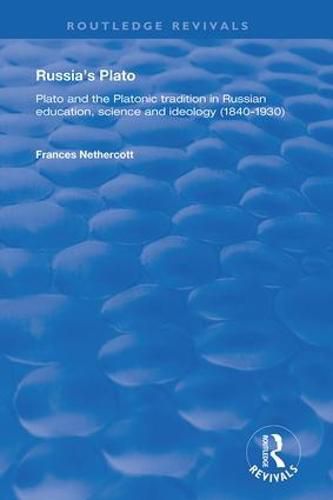Readings Newsletter
Become a Readings Member to make your shopping experience even easier.
Sign in or sign up for free!
You’re not far away from qualifying for FREE standard shipping within Australia
You’ve qualified for FREE standard shipping within Australia
The cart is loading…






This title was first published in 2000. This work identifies the differences between the Russian intellectual approach to reading Plato and that of other European countries. This study offers a complex perspective on Russian philosophical learnings up to 1930. The book contains five chapters with the first aiming to provide the general institutional context in which Russian 19th century Plato scholarship developed, caught as it were, between the rise of the historical sciences and the heavy hand of state interference in standardizing the educational system in the name of nation building and modernization. The second chapter attempts to illustrate how Plato served as a reference in Russian philosophical culture and the third deals with aspects of Russian philosophy of law. In the fourth chapter, the author shifts his approach to compare and contrast a number of reactions to a single dialogue, the Republic and in the final concluding chapter, addresses the question of whether it is legitimate to speak of a Russian Platonism.
$9.00 standard shipping within Australia
FREE standard shipping within Australia for orders over $100.00
Express & International shipping calculated at checkout
This title was first published in 2000. This work identifies the differences between the Russian intellectual approach to reading Plato and that of other European countries. This study offers a complex perspective on Russian philosophical learnings up to 1930. The book contains five chapters with the first aiming to provide the general institutional context in which Russian 19th century Plato scholarship developed, caught as it were, between the rise of the historical sciences and the heavy hand of state interference in standardizing the educational system in the name of nation building and modernization. The second chapter attempts to illustrate how Plato served as a reference in Russian philosophical culture and the third deals with aspects of Russian philosophy of law. In the fourth chapter, the author shifts his approach to compare and contrast a number of reactions to a single dialogue, the Republic and in the final concluding chapter, addresses the question of whether it is legitimate to speak of a Russian Platonism.